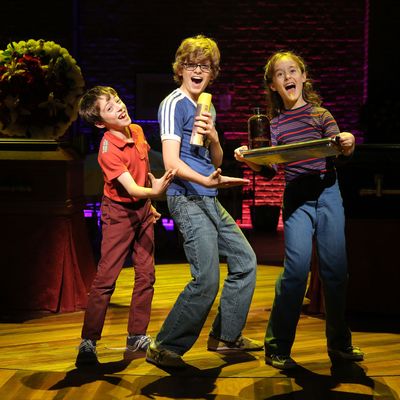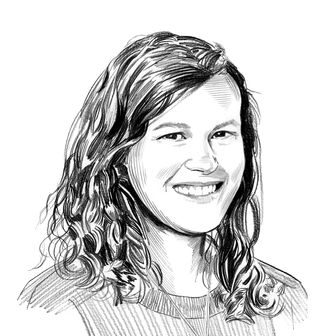
Alison Bechdel would like to clarify something: She didn’t invent the Bechdel test.
“I didn’t coin that term,” she explained to the Cut. “I don’t know how that came to be associated with my name, but I’m very happy that it is.”
The “test” was adapted from a 1985 joke in Bechdel’s serialized comic Dykes to Watch Out For. In the strip, one character informs her date that she will only see a movie that satisfies three criteria: it has to have at least two women in it, and they have to talk to each other — about something other than a man. “The last movie I was able to see was Alien,” the woman says dryly. “The two women in it talk to each other about the monster.” The “Bechdel test” gained currency among critics as a way to discuss onscreen sexism; meanwhile, Bechdel’s other work has also gained wider appreciation.
Next week, the musical adaptation of Alison Bechdel’s acclaimed 2006 graphic memoir Fun Home opens at the Public Theater. Bechdel’s book chronicles her relationship with her father, a closeted gay man who, as she tells it, committed suicide four months after she came out to her parents as a lesbian. It’s not obvious material for a musical — in part, Bechdel points out, because it’s a non-romantic story about a female protagonist. The show chronicles Bechdel’s discovery of her own sexuality, making it one of the first mainstream musical productions to feature a young, lesbian protagonist.
Bechdel spoke to the Cut about what it’s like to watch your childhood reenacted onstage, her struggle to draw female characters, and her desire to return to Dykes to Watch Out For.
Did you have any anxieties about how Fun Home would be adapted to the stage?
I had no idea how anyone would turn this comic book into a musical. And that’s partly why I agreed to it, honestly. There had been a movie option that I said no to, because I couldn’t bear the idea of a bad movie being made about my life. But, I figured if it were a bad musical, it would just disappear. It wouldn’t stick around the way a movie would.
I’m a very casual consumer of musicals. It’s not like I’m passionate about the form or even know very much about the form, so I felt like it was very much alien territory. And that’s partly, again, why I felt okay about doing it — because it was such a different form, it was easier for me to let go of it.
What’s it like to see these actors perform your life?
It’s really freaky. I’m struggling to find ways to describe it. I’m dealing with two different processes: One is just seeing my book adapted, and because my book is about my life, I’m watching my childhood being re-created in front of me — re-created with a very eerie kind of accuracy. It’s not exactly a replication, but so much of the tone, so much of the emotion, so much of the quality of the characters, just who they are, it’s like they somehow have really captured my life, and it’s really beautiful and really unnerving.
I feel sort of envious of them that they’ve hit these emotional notes — it’s almost like they put acupuncture needles in just at the right spots of the story and have created this amazing resonance.
June Thomas’s review of the show for Slate mentions that this is the first mainstream musical to feature a young lesbian protagonist.
I think it’s less just that it’s a lesbian character and more that it’s a female character, and it is not a romantic story.
For a woman to be the center of that feels quite revolutionary. We’re not used to hearing women’s stories. Even now, in this day and age, it’s still a pretty radical thing to do. And the fact that it’s a lesbian character makes it all the more difficult and all the more risky to get people to identify with her. That felt crucial. I knew [playwright] Lisa Kron’s work and I trusted that she could do it. I knew that she understood the pitfalls.
What were the pitfalls you were worried about?
That people would laugh at something that really is not meant to be funny at all — like the scene where the little girl sees the butch delivery woman. What had to happen was for people to see queer desire as not just legitimate but righteous. We’ve seen a lot of queer desire in musical theater, even if it’s masked as heterosexual desire, because gay men have obviously written and been part of musicals, but lesbians … there’s hardly any representations of that that are really accurate, in any form.
In an interview with the Rumpus, you talk about struggling with how to represent female characters in your comics, because women have been so stereotyped, particularly in comics, but also in most representational art.
Learning to draw women accurately was a long psychic struggle for me. I actually only ever drew boys and men as a little kid. I drew all the time, but I didn’t draw women because … well, it’s a very complicated story and I can’t possibly summarize it now, but it was only when I came out that it struck me: I’m attracted to women, why can’t I draw women? And I started to draw lesbians. I found that I could draw a woman if I thought of her as a lesbian. I still haven’t figured this out, but that’s how I got started, like I had to break through some kind of representational formula. The way women were drawn in all the comics I ever saw was very objectifying, just as the way acceptable female appearance — you know, you had to present yourself, you had to wear makeup and certain kinds of clothing — and I was rejecting all of that.
You’ve said that there isn’t the same need for a comic like Dykes to Watch Out For as there used to be. What do you mean?
Well, I guess I’m kind of reexamining that a little bit. Like, why should I give up on that just because gay people can get married? Maybe I’ll get back to it. Whenever I watch Portlandia, I miss my characters, I miss my comic strip a lot. And why shouldn’t the queer people be in a comic strip for everyone to read? So, I’m kind of reexamining that.
In reference to Are You My Mother?, Kathryn Schulz wrote a piece titled “What Happened to the Coming-Out Memoir?” where she points out that now there seems to be more of a post-gay literary culture, and the coming-out story is on the wane. Do you agree?
I feel like the coming-out story has been waning since it waxed. When I was coming out in the early eighties, I was devouring coming-out stories. I think of a book called The Coming Out Stories, which was an anthology published in 1980, of different lesbian coming-out stories. Getting all those first-person accounts was really exciting to me, but almost immediately people started talking about how we had to get beyond that. Like, that’s not the extent of the story. Certainly now when people are coming out in middle school, there’s no story — there’s nothing to tell, so people can just get on with their life, and tell whatever other more interesting stories they have





